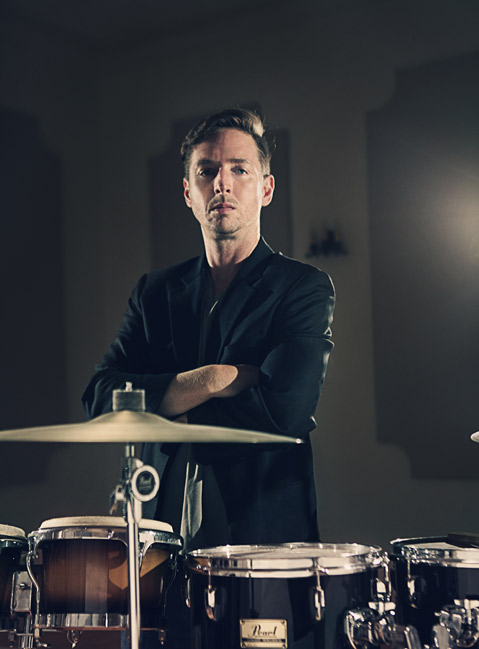Ted Atkatz Explores the Possibilities of Percussion
S.B. Symphony Season Opens with Rouse on October 12
People have preconceived notions about percussion. That’s Ted Atkatz’s lament, and he has a point. Most of us think of drums, cymbals, and their cousins as essentially rhythm instruments — ways of keeping the beat. But to the virtuoso percussionist and longtime Music Academy of the West instructor, who will be guest soloist for the opening weekend concerts of the Santa Barbara Symphony, that’s ridiculously reductive.
“To find the lyrical and linear side of percussion is a lifelong pursuit of mine,” Atkatz said in a recent interview. “There are so many nuances to be found.

“I have learned over the course of a lifetime in music that every instrument can serve as a melodic instrument. It’s about finding these long lines, in the same way that a clarinetist spins a phrase. Every instrument can sing a song.”
Atkatz will demonstrate this lyricism Saturday and Sunday at the Granada Theatre, when he joins the orchestra for a performance of Christopher Rouse’s Der Gerettete Alberich. The contemporary American composer describes the work as a “Fantasy for Percussion and Orchestra.”
“It’s a real challenge,” he said from his home in Los Angeles. “This is the first time I’ve played it. I was asked by Nir Kabaretti and the Santa Barbara Symphony people to take it on. It’s been about 200 hours of practice time, and I’m not quite there yet.
“The concert is opening with a Wagner overture to celebrate that composer’s bicentennial. This piece ties into Wagner in that it’s Rouse’s sort-of sequel to the Ring Cycle. He calls it a fantasy based on the character of Alberich, who [in Wagner’s opera Das Rheingold] renounces love in the name of gold. He’s a little troll-like character.
“Rouse lifts from the end of the Ring directly at the beginning of the piece, so he’s very clearly making this feel like it’s the sequel or maybe a prequel. After these direct quotes from the Ring, it goes into something very otherworldly and modern sounding. The way I interpret is this piece is Alberich running amok. A lot of it is like hell has broken loose. It goes through a lot of different moods over the 20 minutes.
“At the beginning and end of the piece, he uses two güiros. That’s a Latin instrument. It’s essentially a gourd which has been dried out. Maybe 30 or 40 ridges are cut out of it. You play it by scraping it. It simulates the sound of speech or laughter. Rouse writes underneath [the final notes of the score], ‘Ha ha ha ha!’ Albrecht survives, and he’s laughing about the mess he has made.
“It’s kind of a bold statement that he’s making, paralleling his music with that of Wagner,” he said. “It’s gutsy. But that’s one of Rouse’s great characteristics. It’s strong, powerful music.”
Atkatz is a fan of bold choices: He has been making them all his life. The native of Queens, New York, took up the drums at age 10, when his father, an advertising man and amateur violinist, instructed him and his brother to choose an instrument to play.
“I picked the drums,” he said. “I had been listening to my parents’ Beatles records, and I wanted to be Ringo Starr.”
He gradually got more and more serious about his music, although when he attended Boston University, “I didn’t envision becoming a professional musician,” he said. He earned a dual degree in percussion performance and teaching and spent a year after graduation teaching music to elementary school students in Massachusetts.
“It was rewarding, but it was also the hardest job I’ve ever done,” he recalled. “I also really missed performing. So I decided to get my master’s at the New England Conservatory. At that point, I wrapped my brain around ‘Let’s try and make a go at becoming an orchestral musician.’ Miraculously, I did.”
In fact, he got a position with one of the best orchestras in the nation: the Chicago Symphony. “I learned how to be a musician playing in that orchestra,” he said. To many people’s surprise, he resigned after a decade and moved to Southern California to pursue a more varied career, including playing and singing in his own rock band.
“Los Angeles is the perfect city for a musician who has a bunch of diverse interests,” he said. “Any given week, you can find yourself recording a John Williams movie score, playing in an orchestra, or performing with a rock band. There are venues and audiences and opportunities for all of those. I’ve got a wandering mind; any chance I have to change things up is good for me.
“We premiered a piece of mine at the Music Academy this summer for two percussionists,” he noted. (The year 2013 marked his 11th year at the school.) “It looks like I’m being commissioned to do some other writing. So that’s a new direction I’m exploring.”
So how — as a composer and/or performer — do you make a percussion instrument sing? “It’s definitely a technical thing,” he said, “but it’s also a mindset. You can always surprise someone with percussion.”
4•1•1
Ted Atkatz performs with the Santa Barbara Symphony on Saturday, October 12, at 8 p.m. and Sunday, October 13, at 3 p.m. at the Granada Theatre (1214 State St.). Call (805) 899-2222 or visit thesymphony.org for tickets and info.



